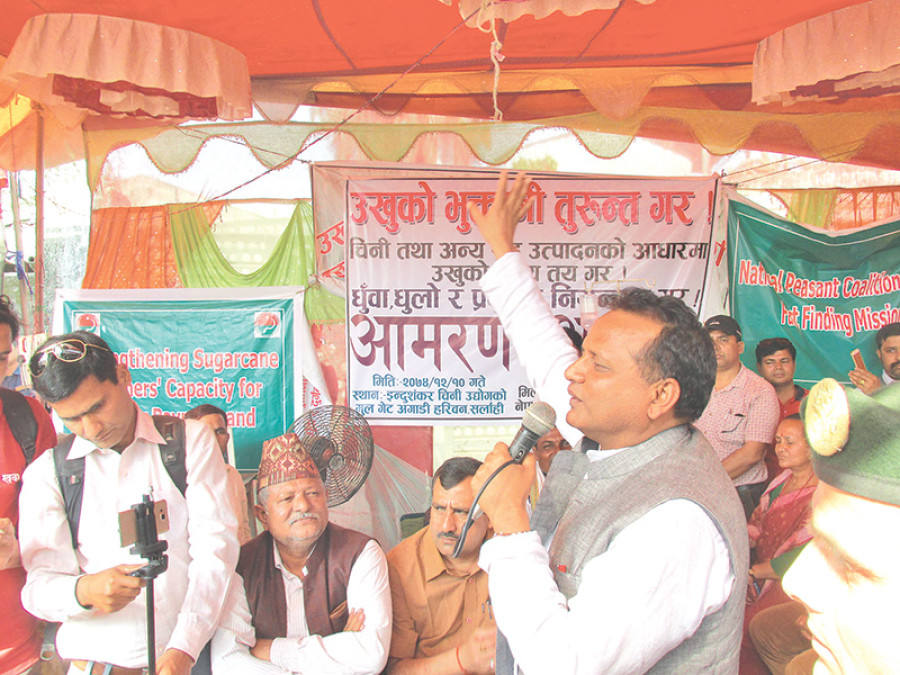Money
Farmer’s death fast against non-payment enters third day
A fast unto death by Shesh Mahabubh Reja to protest against nonpayment of dues to sugarcane farmers by sugar mills entered its third day on Monday.
Aman Koirala
A fast unto death by Shesh Mahabubh Reja to protest against nonpayment of dues to sugarcane farmers by sugar mills entered its third day on Monday.
The ward chairman of Hariban Municipality-11 is holding his hunger strike on the premises of Indu Shankar Sugar Mill which owes more than Rs2 billion to farmers for their sugarcane.
Reja said that he would continue his strike until mill owners revealed details about the outstanding payment to sugarcane farmers. “Owners of sugar mills tend to disburse the payment for just a week’s worth of sugarcane,” said Reja. Despite repeated commitments that payment would be made soon, mill owners have failed to specify the date of payment for the sugarcane supplied by farmers in previous months. A meeting of Hariban Municipality asked mill owners to pay sugarcane farmers immediately. The municipality said that it was concerned over the recurrent delays by mill operators to pay for the harvests of sugarcane farmers. The meeting also concluded that it was disappointing that the sugarcane industry had not paid enough heed to the demands of sugarcane farmers although they have been holding a protest for the last two weeks. It also expressed unity over the genuine demands of sugarcane farmers.
Issuing a statement after the meeting, Mayor Ganesh Uprety thanked Reja for continuing his strike on behalf of the public. He also warned that the sugar industry would have to bear the responsibility if something untoward were to happen to the protestors.
Chief Minister of Province 2 Lal Babu Rawat visited the site and expressed solidarity with the sugarcane farmers. He said that the provincial government would come up with immediate steps to resolve the problem. Entrepreneurs have been exploiting sugarcane farmers, he added. In a conversation with Rawat, representatives of sugarcane farmers demanded that the payment for sugarcane delivered until mid-March should be disbursed at once.
A leader of sugarcane farmers, Raj Kumar Uprety, said that the protest would not stop as the promises made by entrepreneurs were meaningless. “The entrepreneurs said that they would disburse payment for just one week. As per this timetable, farmers will not get payment even till the end of Dashain,” said Uprety.
Indu Shankar Sugar Mill alone owes more than Rs2 billion to sugarcane farmers for their crops. Farmers have been borrowing money for their daily expenses including food. The delay in payment for sugarcane has resulted in many farmers covering their everyday expenses through loans at exorbitant interest rates. Uprety said, “Currently, we are facing a situation where creditors won’t trust us for loans as payment has been delayed for more than four months. We are having a hard time borrowing money due to the uncertainty in payment.”
Reja’s health condition is deteriorating with the fast unto death entering its third day. His blood pressure is down. Mayor of Hariban Municipality Ganesh Prasai said that a team of sugarcane farmers was scheduled to visit Chief Minister Raut on Monday afternoon. He said, “The provincial government is serious about the demands of sugarcane farmers.
Despite problems such as lack of labour, ageing farmers, payment disputes, unfavourable climate and delays in mechanisation, the sugarcane output in Province 2, including Sarlahi district, has been on an upward trend.
Sugarcane is cultivated on 23,000 hectares in the district, and farmers are expanding their farms to include better irrigation facilities.
Government statistics show that sugar imports and sugarcane production have been increasing at a fast rate, especially in recent years, due to increased consumption. Although sugarcane can also be used as biofuel to produce electricity, the potential remains untapped.
According to the Department of Customs, Nepal imported sugar worth Rs6.72 billion in the last fiscal year 2016-17, a 38 percent jump over the previous year. As the country’s production meets only about 50 percent of the domestic requirement, the shortfall is filled by imports from India.




 9.89°C Kathmandu
9.89°C Kathmandu















